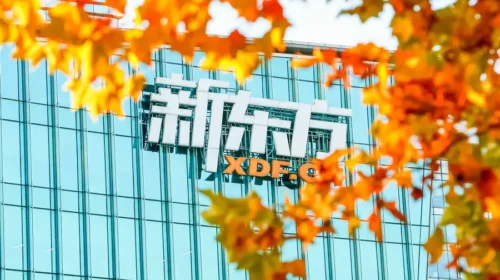Weimob shops breakup plan, but investors aren’t buying it

The e-commerce services provider said it is exploring a spinoff for its marketing services arm, with plans to list it separately on China’s A-share market
Key Takeaways:
- Weimob shares fell 12% after it announced it is exploring a spinoff for its marketing services arm for a separate listing on China’s A-share market
- The company said the unit being spun off is worth 3.6 billion yuan, but the market values the business at less than half that amount
By Doug Young
First it was Baozun (BZUN.US; 9991.HK) that made a big strategic shift with a major move into brand management, launched by its 2022 purchase of U.S. retailer Gap’s (GPS.US) China operations. Now, China’s other major e-commerce services provider Weimob Inc. (2013.HK) is conducting its own major shakeup. But unlike Baozun, Weimob is thinking small with its newly announced plan to break itself up into its two major pieces.
Under the plan unveiled earlier this week, Weimob would hive off the domestic portion of its marketing services arm, Shanghai Weimob Culture Media Co. Ltd., with an aim of eventually listing the company on China’s domestic A-shares market, according to its announcement to the Hong Kong Stock Exchange.
Investors weren’t too impressed with the plan, hiving off nearly 12% of Weimob’s market value after the announcement. That continued a downward trend for the stock, which is now down 30% this year and has lost about two-thirds of its value over the last 52 weeks.
The company was once an investor favorite, counting JPMorgan, BlackRock and Goldman Sachs among its major investors, all betting on the big potential of China’s e-commerce market. But all of those have abandoned Weimob by now, with the exception of JPMorgan, as the company has lost money for the last four years.
Even after the selloff, Weimob still looks like a winner, at least when compared to Baozun. It currently trades at a price-to-sales (P/S) ratio of 2.24, compared to just a 0.10 for Baozun. But global rivals Shopify (SHOP.US) and Salesforce (CRM.US), which are both far larger, trade at much higher multiples of 15 and 8, respectively, reflecting investor bullishness about the future of e-commerce globally.
Both Weimob and Baozun are constrained by their confinement to China, where e-commerce boomed for years before slowing sharply recently as Chinese consumers have become more cautious due to a slowing economy. Weimob started out serving merchants on Tencent’s popular WeChat platform, though it has tried to diversify onto other platforms as well. Baozun is similar, starting out primarily serving merchants on Alibaba’s (BABA.US; 9988.HK) popular Taobao platform.
So, why were investors so spooked by the breakup plan?
A major reason could be that Weimob seems to think the business being split off is worth far more than the market does. According to its announcement, Weimob will sell 50% or more of Shanghai Weimob Culture Media based on a target valuation of 3.6 billion yuan ($506 million). The ultimate aim, it said, was to list Shanghai Weimob Culture Media, on one of China’s domestic A-share markets, which tend to value Chinese companies higher than more internationally-focused markets like Hong Kong.
Information in the announcement shows that the unit being spun off accounted for about 30% of Weimob’s revenue in 2022. Some simple math shows that 30% of Weimob’s current market value of HK$5.36 billion ($685 million) equals HK$1.6 billion, or about 1.46 billion yuan. In other words, the market thinks Shanghai Weimob Culture Media is worth less than half what Weimob believes the unit is worth.
Strong growth
It’s a bit unclear just how Shanghai Weimob Culture Media is doing financially in terms of growth. The company is the domestic arm of Weimob Marketing, one of Weimob’s two main businesses, which as we previously noted accounted for 30% of the company’s revenue in 2022. The other business is Weimob Corporate Services, which operates the company’s original business providing software as a service (SaaS) products to e-commerce merchants.
Weimob only announced the reorganization into those two separate units in its latest interim results in August, and hasn’t given any separate revenue figures – or growth rates – for the two businesses until this week’s breakup announcement.
But the company’s overall revenue growth looked quite solid, at least in the first half of last year. Its revenue rose 34.5% to 1.2 billion yuan, as Chinese consumers resumed spending with the end of the country’s strict pandemic restrictions. That marked a sharp improvement from the previous two years, when the company’s revenue was flat or even contracted. Analysts expect the recent growth to continue this year, forecasting it will rise about 20%, according to Yahoo Finance.
The company’s gross margin improved slightly to 67.5% in the first half of last year from 66.4% a year earlier. That improvement, combined with the strong revenue growth, helped the company to narrow its net loss to 452 million yuan from 608 million yuan a year earlier. The company is relatively cash-rich with 2.1 billion yuan in cash as of last June. What’s more, analysts see it finally becoming profitable again this year.
In addition to getting a boost from the end of Covid restrictions, Weimob may also be getting a lift from its more recent strategies of focusing more on its biggest customers. In its interim results, it said it is on track to meet its strategic goal of having more than 100 customers with revenue over 10 million yuan, and more than 1,000 customers with revenue over 1 million.
Weimob has also stated it wants to become more global, though its failure to break out any global sales figures to date seems to imply that part of the business is still inconsequential.
All of that brings us back to why investors are fleeing this company, and also why the latest deal seemed to spook them so much. The company’s unrealistically high hopes for the unit being spun off seems to be a major reason, combined with the fact that Weimob is likely to lose 30% of its revenue with the spinoff.
At the same time, investors are probably highly skeptical of Weimob’s ability to go global, since it has no obvious advantages or experience that would allow it to take market share from more established players like Salesforce or Shopify. Instead, the company is likely to remain closely tethered to its home China market for the foreseeable future, which looks problematic as its business is likely to weaken with the country’s slowing economy.
The Bamboo Works offers a wide-ranging mix of coverage on U.S.- and Hong Kong-listed Chinese companies, including some sponsored content. For additional queries, including questions on individual articles, please contact us by clicking here.
To subscribe to Bamboo Works free weekly newsletter, click here






